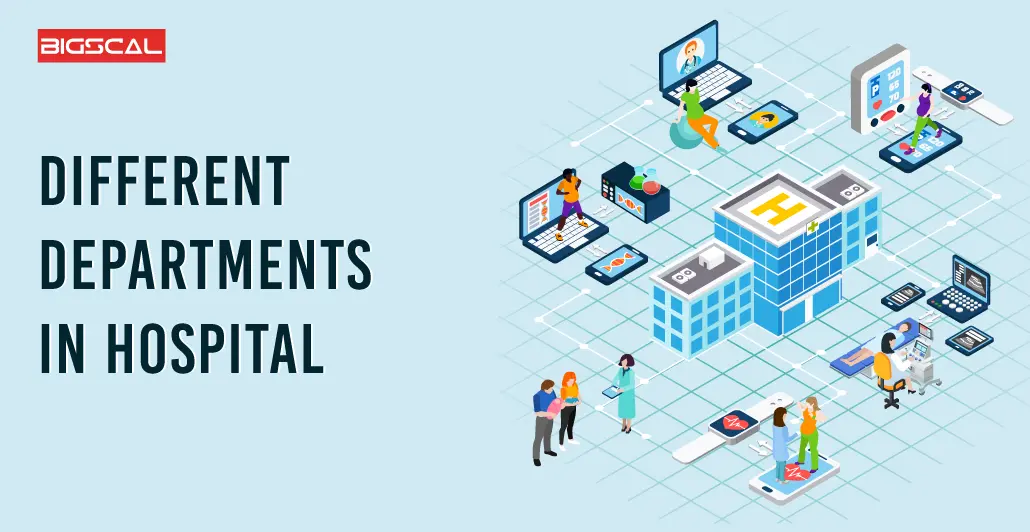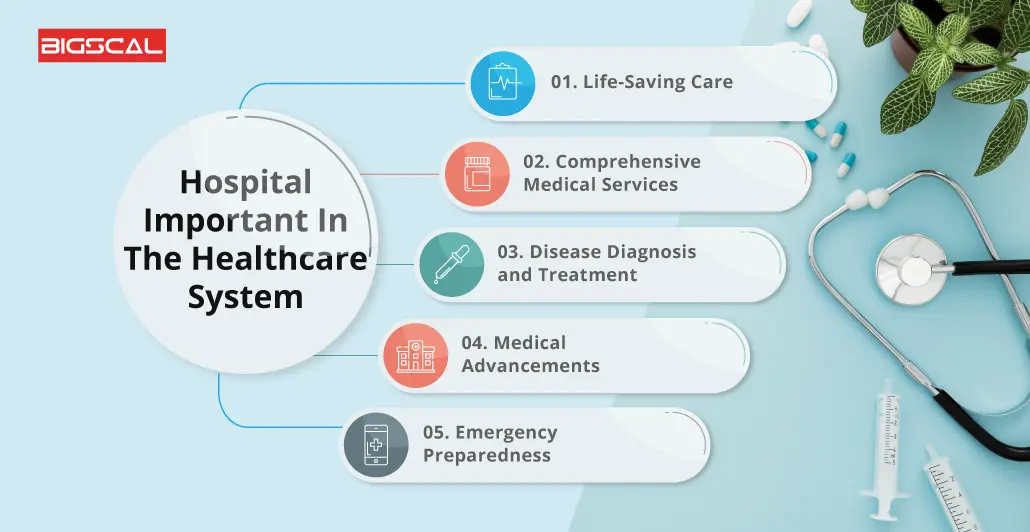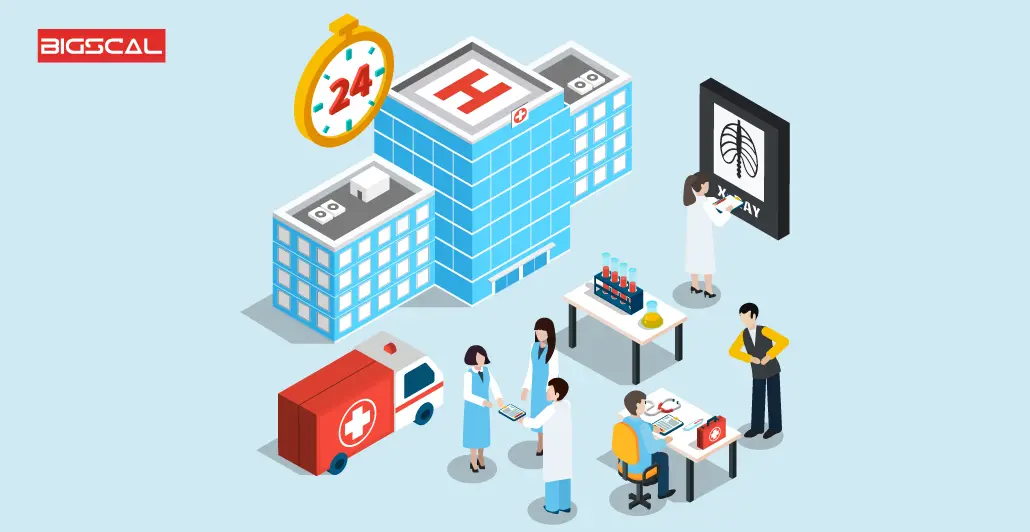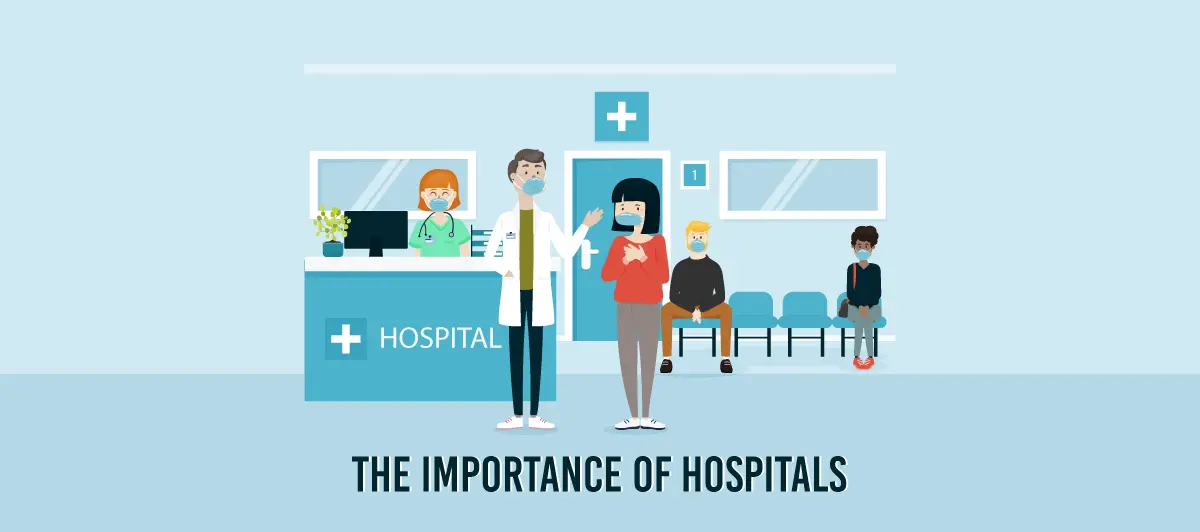Why are Hospitals Important? Departments, Importance, and Future
Quick Summary: Hospitals are important for health care delivery. Thus, they include many departments and health care providers such as emergency, ICU, surgical, and outpatient offices. They save lives, cure disease, and promote well-being. In the future, they will continue to advance medical science, improve patient care, and adapt to changing healthcare needs. For a detailed answer on why are hospitals important? Read the script.
Introduction
Hospitals are important in our society and serve as the backbone of healthcare systems worldwide. Hence institutions are essential for our national health service system for several compelling reasons. But exactly Why are Hospitals Important?
Firstly, clinics are the primary centers for diagnosing and treating illnesses and injuries. They house ambulatory services, a multitude of specialized departments and acute services, from emergency care to advanced surgical units, ensuring comprehensive medical attention.
Moreover, clinics and emergency rooms are crucial in emergencies, providing immediate health care workers and life-saving interventions. Hence, their existence is critical for world health organization, disaster response and managing unforeseen health crises.
Clinics are vital not only for individual health but also for the public and health systems. Additionally, they play a pivotal role in disease control, research, and the development of medical innovations, contributing significantly to global health improvements.
As we move forward, the importance of hospitals is expected to grow. With advancing medical technologies and an aging population, hospitals will continue to evolve, adapting to the changing healthcare landscape and remaining at the forefront of healthcare delivery.
Want to know why are clinics important to a community and what do hospitals provide?
Keep reading
What is a hospital?

A hospital is a healthcare organization that offers medical and nursing health care services offered by clinics along with medical supplies to the patients. General hospitals are the most well-known form of clinic. These hospitals usually carry an emergency department that handles health care concerns that are urgent, like accident victims. Hence, medical emergencies generally go to the surgical departments of these hospitals.
As per the definition of hospitals, every region has a primary healthcare facility called a district hospital. These hospitals have beds, especially for intensive care, and even facilities for patients who need long-term acute care hospital beds. Also, there are separate trauma centers, children’s hospitals, rehabilitation centers, and senior hospitals. These different kinds of specialty hospitals can help cope with particular medical conditions.
For example, psychiatric care is a specialized kind of medical service. In comparison to general hospitals, specialized hospitals can help you save money spent on health care. If hospital statistics divide on the basis of revenue, hospitals are of three types: general, specialized, or federal government.
On the other hand, teaching hospitals provide healthcare services along with medical education for medical students and nursing students. Moreover, there also exist clinics that are smaller medical care facilities than hospitals. The departments and specialty units of the hospitals are different. Certain hospitals have dedicated outpatient and chronic care centers. Additionally, examples of common support units are pathology, radiology, and pharmacy.
What are the different departments in modern hospitals?

To understand why hospitals are important you need to take a look at its departments. Hence modern hospitals encompass various departments of medical centers, each serving a distinct purpose:
- Emergency Department (ED): The ED provides critical care for patients with life-threatening conditions, injuries, or sudden illnesses.
- Outpatient Department (OPD): OPD handles non-emergency cases, offering consultation and treatment without hospitalization.
- Intensive Care Unit (ICU): The ICU specializes in critical care, catering to patients with severe illnesses or post-surgery recovery.
- Operating Room (OR): The OR is where surgeries take place, with a sterile environment and specialized equipment.
- Laboratory: This department conducts tests, analyzes samples, and aids in disease diagnosis.
- Radiology: Radiology uses imaging techniques like X-rays and MRIs for diagnostic purposes.
- Pharmacy: The pharmacy dispenses medications prescribed by doctors.
- Maternity Ward: This department caters to expectant mothers, providing prenatal care and delivery services.
- Pediatrics: Pediatrics focuses on the healthcare needs of children, from infants to adolescents.
- Specialty departments like Cardiology and neurology. Orthopedics, Oncology and Gastroenterology
- Psychiatry: Psychiatry deals with mental health issues and therapies.
- Physical Therapy: This department aids in rehabilitation and physical recovery.
- Dietary Services: Dietary services provide patient-specific nutrition plans.
- Infection Control: Infection control ensures a safe and hygienic clinic environment.
- Administration: The administration is responsible for the operation and management of the clinic.
- HR: HR is responsible for the recruitment and welfare of employees.
These departments therefore collaborate to provide comprehensive health care to patients and communities.
Why are hospitals important in the healthcare system?

Are you interested to see what services do hospitals provide? They play an important role in population health and health care for several complex reasons:
Life-Saving Care:
Clinics are important because they provide life-saving treatment. Thus, in emergencies, such as accidents or serious illnesses, clinic provide the resources, knowledge and medical personnel to stabilize patients and provide intensive care. These immediate interventions often make the difference between life and death.
Comprehensive Medical Services:
Clinics offer a wide range of medical and specialty medicines under one roof. Additionally, this clinicl system and medical facility ensures that patients can access a wide range of healthcare services. From routine check-ups to complex surgeries, without the need for multiple trips to different locations.
Disease Diagnosis and Treatment:
Clinics are important in diagnosing and treating diseases and conditions. These studies explain why hospitals are important. Thus, they have state-of-the-art diagnostic equipment, laboratories and medical experts who can accurately diagnose diseases. Furthermore, early diagnosis and appropriate treatment improve patients’ chances of recovery.
Medical Advancements:
Clinics and pharmacies play pivotal roles in conceptualizing, implementing, and developing new drugs and therapies for treating illnesses. This fact, in its turn, encourages them to work together with universities and research institutions aiming to develop novel therapies, drugs, and pharmaceutical technologies. These ventures remain a major cause of the constant improvements in the healthcare methods and not just for those alive during these times but also for others in the future.
Emergency Preparedness:
Hospitals are an important part of preparations to combat all kinds of emergency outbreaks. The thing is they have not only direct systems but also material and skill resources to be the first responders of public health crisis, natural disaster and diseases outbreak. When a natural disaster strikes clinics become indispensable; being an anchor in such situations provides invaluable medical care, assistance and resources to the affected communities.
Besides, clinics take a prominent place in health system because of the life-saving power, comprehensive globe of health care services, pros in disease management, role in medical development, quick emergency response and preparedness. Local level is the basis and theory where population’s health and needs should be focused and developed. These all are the reasons that proves that why are hospitals important to society.
The future of hospitals

Significant changes in modern health care are set to make clinics the future. Hospitals have evolved to meet the growing needs of patients and the advances in medical care.
The answer to why hospitals are important, makes it clear that the future of hospitals is bright. Also a notable change is the increased emphasis on telemedicine and telemedicine. Thus, with the expansion of telehealth services, patients can access health care providers from the comfort of their own homes. It not only improves workplace efficiency but also reduces the burden on clinics resources.
Automation and artificial intelligence (AI) are also playing an important role. Robots can assist in surgeries, administer medications, perform routine tasks, and reduce human error to improve efficiency. In addition, AI-powered diagnostics and predictive analytics support early diagnosis and personalized treatment plans.
Additionally, the overall clinic and environment itself is changing. The focus is on patient-centered healthcare product ux design, creating healing environments that promote wellness and reduce stress. To get started with how to create hospital management software, check out Bigscal .
With a rapidly aging population, many hospitals and other healthcare systems are adapting to better serve older patients, providing them with the specialized care and facilities they need
Thus, in the future,clinics and healthcare organizations will continue to lead the way in medical innovation by embracing technology and patient-centered care to improve healthcare delivery and enhance the overall patient experience. These changes promise more efficient, convenient and compassionate healthcare.
Are you looking for software to manage your hospital? Know how Bigscal can help!
If you are looking for modern, user-friendly hospital management software, consider Bigscal. Our software for hospitals and clinics simplifies clinical practice with ease in mind.
We help develop and present the best hospital management software. It is therefore designed for ease of navigation and accessibility, allowing patient records, appointments and payments to be managed effectively.
Our user-friendly interface simplifies daily tasks, helping you focus on patient care rather than software challenges. Therefore experience a hassle-free way to manage your hospital effectively with Bigscal’s intuitive and best software for hospitals.
Conclusion
By now you might have got an answer to why are hospitals important and why do we need hospitals? clinics play a vital role in our lives. With departments dedicated to emergency care, surgeries, and specialized treatments, they address a wide range of our health care needs. Their importance lies in saving lives, promoting health, and providing essential medical services.
As we look ahead, clinics will continue to evolve, harnessing technology, research, and skilled professionals to enhance patient care. Hence they remain a cornerstone of our healthcare system, ensuring that people receive the care and attention they need in times of illness and emergencies. The future holds promise for even more advanced medical solutions and improved healthcare outcomes.
FAQ
What is the meaning of hospital?
A clinic is a healthcare facility where medical professionals provide diagnosis, treatment, and care for various illnesses, injuries, and medical conditions.
What was the first hospital?
Hospitals exist for a very long span of time. Hence the first hospital was founded by “Hotel-Dieu de Paris,” in the middle ages of the 7th century in Paris, France.
Were there hospitals in the 1800s?
Yes, hospitals existed in the 1800s, although they were often quite different from modern hospitals in terms of medical practices, facilities management, and technology.
Why are hospitals important?
People go to a clinics for various reasons, including inpatient beds, medical emergencies, surgeries, diagnostic tests, childbirth, treatment of illnesses, and specialized medical and other health care professionals.
What was a hospital called before?
Hospitals were known by various names in the past. These names were infirmary, hospice, almshouse, or simply a place of healing, depending on the era and region.





